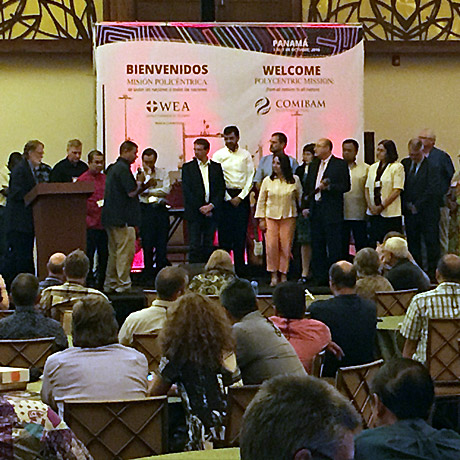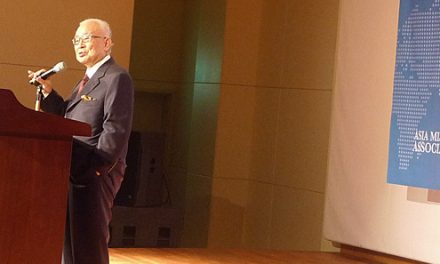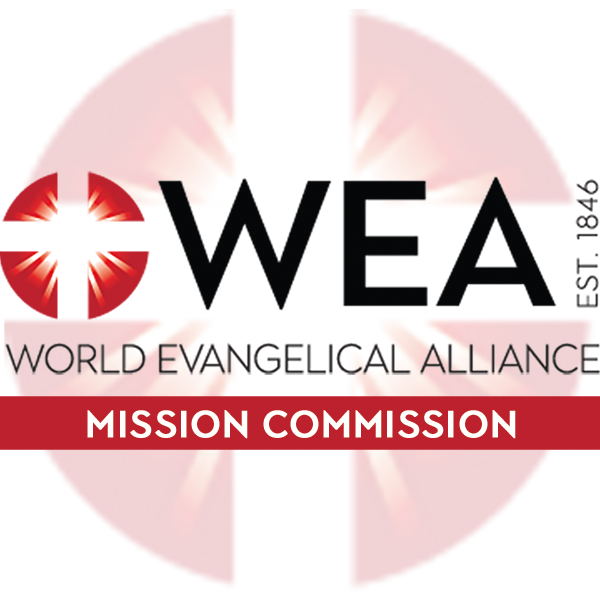THE PANAMA STATEMENT
MC GLOBAL CONSULTATION | OCTOBER 8, 2016
MISSION IN MANY VOICES: POLYCENTRIC & POLYPHONIC
Members of the Mission Commission of the World Evangelical Alliance gathered in Panama City, Panama, 3rd-7th October 2016, to hear from God’s Word and from one another, to pray and worship, and to meet together in order to understand and respond to current obstacles and opportunities for global missions.
With thankful hearts for all that God is doing to further His mission, we celebrate:
- The warm welcome we in Panama from sisters and brothers in the Latin American Evangelical Community.
- With evangelicals in Latin America, the significance of centennial commemorations of the Panama Mission Conference, held here in 1916.
- The contribution to our programme of indigenous Christian leaders and our co-hosts, COMIBAM, in this centennial year.
- In particular, the unprecedented movement of God’s Spirit and of God’s people, often unpredictable and apparently ‘messy’, across Central and South American over the past one hundred years.
- The ongoing contribution of Latin American missiology to the global conversation, particularly noting the gift of the term ‘misión integral’ to global evangelical missiology and we welcome the potential for further self-theologising from within this context as a way of enriching our understanding of what God is doing in mission in our time.
- The embodiment within the Mission Commission of polycentric connection, movement in missions, and a polyphonic missional conversation.
- The continuity of themes emerging in this consultation with those that were explored at the meetings of the WEA Mission Commission at Iguassu, Brazil, in 1999.
- An emerging self-critical understanding within the evangelical missions movement that demonstrates a renewed hopefulness and which avoids paralysis.
DURING THE CONSULTATION, THE LISTENING TEAM NOTED:
- An ongoing engagement with God’s mission understood as ‘from everywhere to everywhere’ and a welcome momentum imparted by our discussions of ‘polycentric mission’.
- A widely spread sense of insecurity, even fear, among members of our evangelical communities in the face of religious opposition, violence and insecurity.
- The deep concern about many young people leaving churches in unprecedented numbers.
- That emerging missions movements in some parts of the world appear to have reached a plateau.
- That, in many instances, the default mode for missionary activity is still one in which the powerful direct and control mission to the powerless.
- A renewed emphasis on missionary self-emptying as a more biblical approach, over and against a ‘win- win’ mentality.
- The global movement of God and the global movement of people at this time in history, which some have described as the ‘age of migration’.
- The limited vision of the evangelical missions movement in adequately understanding and addressing the issues of power and control involved in engaging the indigenous peoples of the world (including those of North America, Latin America, the Sami of northern Europe, the Roma of Central Europe, aboriginal people in Australia and Māori in New Zealand), and in recognising the movement of God’s Spirit among them in many places.
- The need for further reflection on what it means to suffer with others who are persecuted for their faith as they engage in mission in challenging contexts.
The Word of God, through the book of Jonah, was a mirror for us, reminding us that when the world is crying for help the church is frequently found sleeping, insensitive to the despair and the need of the people. God may use the storms of life to wake up the people of God and re-sensitize them as they realize that disobedience severs relationship with God, the depth of which can only be expressed with the poetry of the Psalms. This mirror, which makes us aware of our condition as a disobedient people, also proclaims powerfully to us the love, concern, and compassion of our God who can revive and send us again as Christ’s messengers to a world in need. It also calls our attention to the love, patience and forgiving disposition of our God, a love so deep that we can only contemplate it, without always understanding it.
AN ENCOURAGEMENT TO THE GLOBAL MISSIONS COMMUNITY
In responding to the theme of ‘polycentric mission’ we encourage:
- Caution in simply replacing ‘mission from everywhere to everywhere’ with ‘polycentric mission’. It is important to continue struggling with the implications of both, acknowledging our inadequate success with the former and avoiding the rush to move on to the latter in the belief that the new and the novel will rescue the missionary enterprise.
- Caution in collapsing ‘polycentric mission’ into merely organisational, territorial, denominational, or ethnic categories without recognising its limitless potential for calling us to ever deeper unity.
- Generosity in acknowledging the gift to our evangelical community of connecting with parallel, polyphonic conversations underway in other global gatherings of fellow disciples, including the Lausanne Movement, the World Council of Churches’ Commission for World Mission and Evangelism, and other relevant, missions- focused bodies.
- Further reflection on what each of the local and regional voices in the conversation brings uniquely to the global missions conversation.
- A recognition that the lived experiences of feeling, or of being treated as, either inferior and superior, are consequences of our human fallen nature which the gospel addresses directly. Andrew Walls describes this as, ‘The riches of a hundred places learning from each other’.
- A wide recognition that Christianity is both a local and a global faith. There remains the need for the local church to engage its local context in interdependence with polycentric and polyphonic global missions in the service of the greater unity of the Church and its united endeavours in God’s mission.
Above all, in light of the theme of this Mission Commission consultation, we celebrated the potential revealed by attention to the concept of ‘polycentric mission’. In welcoming the insights of those who have suggested that this could be extended to incorporate closely related concepts, we encourage deeper and ongoing reflection upon the theme. This would include a polyphonic mission conversation, poly-directional mission, poly-generational, cruci-centric or Christo-centric mission postures, and unity in missions.
Taken together with the notions of polycentric mission and ‘mission from everywhere to everywhere’, these closely-related ideas point to the relativising of all centres of influence and power in light of the claims of the cross and of Christ. This extends over all competing loyalties, whether ethnic, cultural, national, political, generational, denominational, or organisational, and offers a re-centring of a united polyphonic missional conversation.
IN CONCLUSION
Thankful for all that the Lord of the nations showed us over our days together, we left members of the consultation with questions rather than a final summary statement, inviting others to add their voices to an ongoing global conversation:
- How are we to remain faithfully and self-critically open to the transforming influence of the Bible upon our missions practice, as it is read in context?
- How can we encourage patterns of missionary spirituality that equip and enable us to the practice of radical love of others so that we can better hear and understand their alternative and diverse voices in a global polyphonic chorus of worship and witness?
- In what ways can we ensure that our exploration of ‘polycentric mission’ in this consultation continues to inform our understanding of contemporary mission practice and theology?
- In what ways might a trinitarian understanding of God’s mission ensure the adequacy of our expressions of the polycentric and polyphonic nature of global missions?
Members of the Editorial Committee (Felipe Byun, Samuel Escobar, Darrell Jackson, Ruth W.)
October 8, 2016





